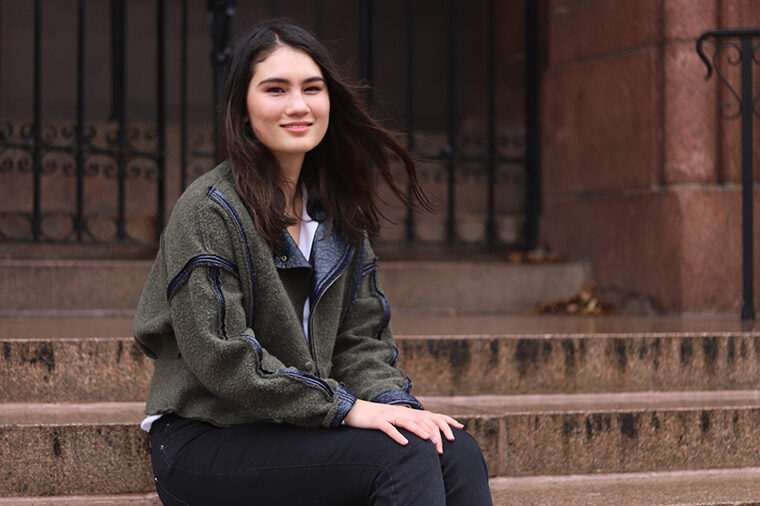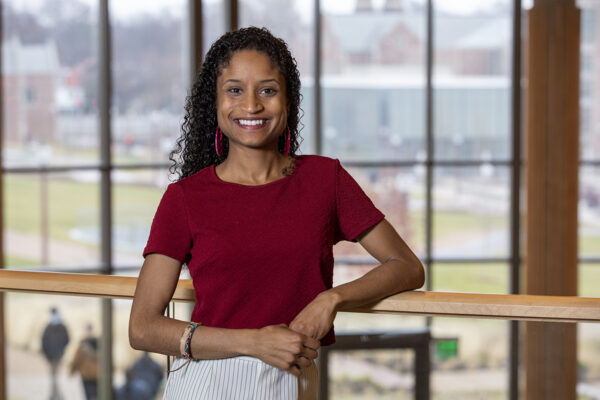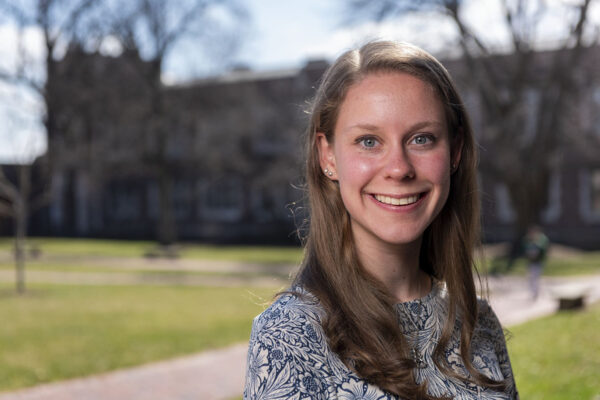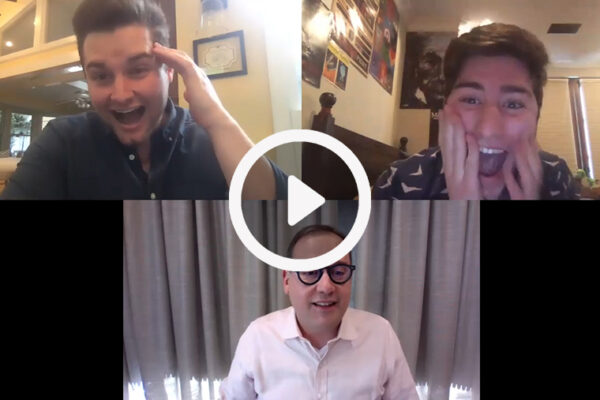Cameron Hill was working late in the laboratory on a Friday night in July 2017 when she heard about a protest going on outside one of the two St. Louis jail facilities. While her experiment ran, she read about the intense heat inside the Medium Security Institution, colloquially called the Workhouse.
“Earlier in the day, I had called my mom to say, ‘This heat wave is horrible. I don’t know why I ever left California,’” said Hill, an Annika Rodriguez Scholar at Washington University in St. Louis, who will earn her degree in anthropology in Arts & Sciences this month. “When I realized that there were people who were in the same heat wave, but were in a concrete structure that intensified the heat, I was just so horrified.”
 Hill plans to become a doctor, but her concern went beyond the physical.
Hill plans to become a doctor, but her concern went beyond the physical.
“What I’ve learned is that 99 percent of people in the Workhouse are people who couldn’t afford their bail,” Hill said. “They haven’t been convicted of anything yet; they just don’t have the funds to pay bail. On average, they are waiting over 200 days for their trial.”
It was a situation that struck close to home.
“I think I was especially sensitive to the idea of people being held in jail — not because of anything they had been found guilty of, but just because of circumstances beyond their control,” she said.
Hill’s Japanese grandparents had been forced to relocate to an internment camp, Manzanar, during World War II. As a mixed-race teenager growing up in a mostly white suburb in the Bay Area, she made a personal pilgrimage to Manzanar. The experience shook her.
“I had always heard stories about what happened. I knew that during World War II, my grandparents had to leave their friends and their home, and that they were put in a desolate camp surrounded by barbed wire,” Hill said. “But to actually visit? I feel like even now I don’t have the words to describe how shocking it was.
“I think about it a lot,” Hill said. “Even though we live in America — which is based on these ideals of freedom and equality — those ideals are not necessarily enacted. Not everyone has the same amount of freedom and equality.”
An unshakeable commitment to equity
Hill’s experience as a Rodriguez scholar and as a fellow of the Aspen Institute informed her next choice: taking on the flawed bail system.
Working with Julia Macias, assistant dean in the Office of Scholar Programs at Washington University, Hill arranged to do an internship with the St. Louis Division of Corrections as part of her work with the Medicine & Society Program.
Hill wanted to develop an algorithm that could help St. Louis jails move toward a risk-based pretrial release system, instead of a resource-based one. In a risk-based model of release, inmates are released prior to trial based on two factors: (1) the risk they pose of not showing up to trial, and (2) their risk to the community.
A good first step was rewriting the division’s intake survey to include more questions that help stratify risk.
That internship might have seemed an unusual choice for a pre-med student. But it taught her a lot, especially about listening. Only by becoming friendly with nurses, security guards, corrections officers and others at the jail, was she able to gain insights into the jail system that allowed her to succeed in completing her proposal for changing the intake process.
Joshua B. Rubin, MD, PhD, who leads the cancer research laboratory at the School of Medicine where Hill worked for two years, was not surprised to see how much Hill made of this experience as well as her community engagement work as a weekly tutor with the Hawthorn Leadership School for Girls.
“Like the very best of WashU undergraduates, Cameron is incredibly smart and knowledgeable in so many areas. In the lab, she was talented, highly skilled and tenacious,” Rubin said. “What sets her apart is the way that these prodigious qualities are melded with her unshakeable commitment to fairness, tolerance, justice and service.
“I am always impressed by the excitement, hopes and ambitions of WashU students, but it was Cameron who inspired me to reach out to underserved communities where I am now working to bring science education to young children,” he said.
“I am already looking forward to reading about her future achievements as I am certain they will be as remarkable as she is powerful,” Rubin said.
A lived experience
Hill is the youngest of two siblings and was raised by her mother. Her father died from an aggressive cancer that begins within the brain when Hill was only a child. Hill’s research in the Rubin laboratory was focused on that cancer, glioblastoma — specifically, on the cellular mechanisms that predispose men to develop glioblastoma at a significantly higher rate than women.
Hill served on Washington University’s Global Health Student Advisory Committee and is also part of the MARC U-STAR program, funded by the National Institutes of Health (NIH), which seeks to increase diversity in research.
James Skeath, professor of genetics and supervisor of the MARC U-STAR program, noted: “What I have found most impressive about Cameron is her uncommon, really exceptional, ability to absorb feedback and instruction on her research and presentations and translate it into improved performance that goes well beyond the boundaries of the instruction provided.”
On campus, Hill is a member of the Kappa Kappa Gamma women’s fraternity and was one of the founding members of Sisters of Color, an affinity space and advocacy group for women of color in Greek life.
This summer, she will begin a one-year fellowship with the American Voices Project, organized by Stanford University. She will also apply to medical schools.
The purpose of the project is to capture a snapshot of the myriad experiences of Americans throughout the country in order to better inform government policy to combat rising inequality in the United States. During her fellowship, Hill will travel to six communities throughout the U.S. interviewing people about their lives.
Hill credits her experience with the Rodriguez scholar community as a pivotal one in her personal development.
“Being around such highly motivated, creative and kind people propelled me to want to be a better and more engaged student and citizen,” Hill said.
“Everything that I’ve done has been because other people supported me,” she said. “I am so grateful for all the people who have allowed me to do the things that I’ve done because they’ve believed in me and supported me as I’ve taken these risks, these leaps of faith.”



